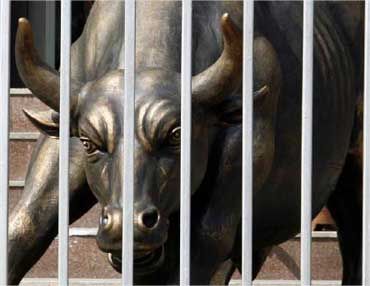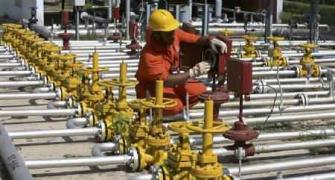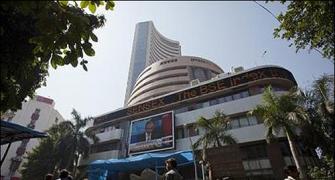Ministers might be fond of attributing the Sensex's rise to renewed interest from foreign investors, betting on an impending revival in the economy, but share prices are influenced more by supply and demand.
 The last edition of Street Food had a passing remark on Indian Oil shares hitting a high of Rs 400 each before cooling significantly.
The last edition of Street Food had a passing remark on Indian Oil shares hitting a high of Rs 400 each before cooling significantly.
This was despite an upward movement in the broader market represented by the BSE Sensex.
Curious, I checked if this was the case with other public sector stocks, especially those of disinvestment candidates. The results were myth-busting. For a government that brands itself a 'doer' and 'execution-minded', the results were anything but flattering.
On September 10 this year, the Cabinet had cleared five per cent stake sale in ONGC, 10 per cent in Coal India and 11.36 per cent in NHPC.
The deals were to be carried out through the offer for sale (OFS) route. "At current market valuations, this will raise Rs 19,000 crore (Rs 190 bn - ONGC), Rs 23,600 crore (Rs 236 billion - Coal India) and Rs 2,817 crore (Rs 28.17 billion - NHPC), amounting to a total of about Rs 45,417 crore (Rs 454.17 billion)," moneycontrol.com had reported at 8.39 pm that day.
Two and a half months later, not a single paisa has been raised. But what has happened to the stocks? All the three have taken a dive, that too, at a time when the Sensex has been hitting new highs every day.
On the day of the Cabinet clearance, ONGC had fallen from the Rs 455 levels days earlier to Rs 445.3. Today, it is trading 15 per cent lower at Rs 381.8.
Similarly, Coal India, which closed at Rs 373.85 on September 10, is now down about seven per cent at Rs 346 levels. NHPC has lost about 10 per cent - from Rs 22.5 to Rs 20.5.
What is the net impact of this slide on state finances? ONGC's five per cent stake sale will fetch Rs 16,334 crore (Rs 163.34 billion) instead of Rs 19,070 crore (Rs 190.70 billion); Coal India's sale will raise Rs 21,890 crore (Rs 218.90 billion) instead of Rs 23,612 crore (Rs 236.12 billion) and the NHPC disinvestment will fetch Rs 2,550 crore (Rs 25.50 billion) instead of Rs 2,830 crore (Rs 28.30 billion).
As such, Rs 4,738 crore (Rs 47.38 billion) vanished in about 50 trading days. If one looks at the 52-week highs each of these stocks hit in the second week of June, soon after a new government came to power at the Centre, the loss swells to about Rs 8,500 crore (Rs 85 billion), as both the big stocks were trading at above the Rs 400-mark.
What explains the fall against a booming Sensex (up 11 per cent since June and five per cent since September)?
Ministers might be fond of attributing the Sensex's rise to renewed interest from foreign investors, betting on an impending revival in the economy, but share prices are influenced more by supply and demand.
It has already been announced to the market that a huge number of shares are on the way; it has been told to hit the target of Rs 43,425 crore (Rs 434.25 billion), only two big stocks are being bet on.
Any fund manager worth his salt holding these shares will know she/he can buy these back cheaper from the government sale.
So, he starts selling, beginning a self-fulfilling cycle. Short sellers and arbitrageurs join the party.
These entities have practically stolen the money from the government's pockets; the more the delay, the bigger their booty. In fact, the OFS route was tailor-made to enable quick money-raising precisely to avoid such loss of value.
What explains the delay? An analysis of newspapers points to two events after the Cabinet decision - the finance minister's hospitalisation and the shuffling in North Block, when top officers were replaced en masse.
The Street terms this a concentration risk - too much riding on too few.
Stocks or people, concentration is a high-risk strategy.










